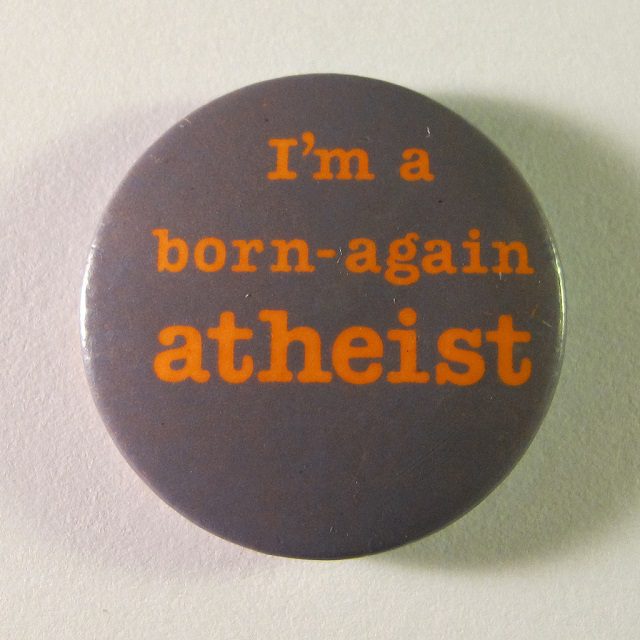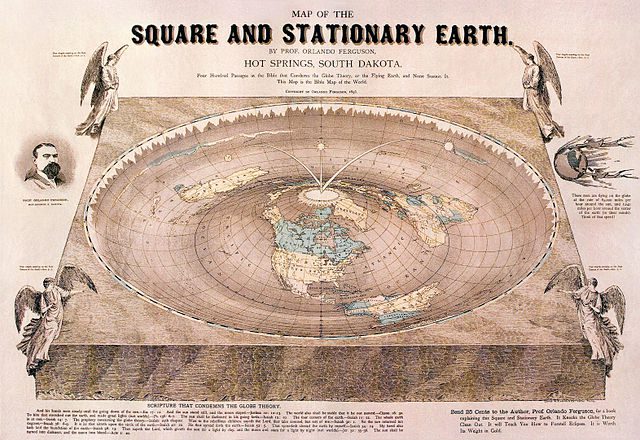
Photograph by “||read||” (5-28-09) [Flickr / CC BY 2.0 license]
***
(9-20-07)
***
“DagoodS” is a friendly atheist with whom I have had many enjoyable dialogues in the past (usually about alleged biblical contradictions) [later we met in person several times]. Recently on his blog I asked him if he could write out his “deconversion” story for me to critique, and he has commenced doing so. His words will be in blue:
* * * * *
Where is your deconversion story? May I critique it, or would you be likely to get all angry and throw a hissy-fit like John Loftus did when I critiqued his? :-)
I highly suspect you would not, based on my pleasant past experience in discussions with you, but it never hurts to ask. I didn’t think he would get angry, either, based on his sublime, lofty rhetoric on good discourse, posted on his blog.
. . . There is something to be said for good old-fashioned flat-out disagreements talked about amiably. That’s about as rare as ice on the sun anymore, sadly . . . but it’s something that all open-minded thinkers of any stripe hold in common. Thus I can feel that affinity with you (as I would with, e.g., the ancient Greeks), despite disagreements on theism, etc.
I have never written out, nuts-to-bolts, my deconversion story. Partly because it is not that interesting, partly because I am far more interested in the arguments themselves, not necessarily the background of the person (hence my own background fades in importance), and partly because it seems sowellnarcissist, perhaps? Does the world really care as to the mechanics of yet another deconvert?
I am uncertain what there is to critique. I am on fairly safe ground to presume you think I did something wrong, because I ended up a non-theist, and you are a theist. Where is the surprise in that?
But if you are truly THAT interested, I can put together something. It would help to know what you are looking to critique. Do you want me to start with being born in a log cabin I built with my own hands? Do you only want the point from There is something rotten in Denmark or where?
Thanks.
Yep, I’m highly interested indeed. Since I consider you one of the best, most reasonable atheist dialogue partners I have encountered, I’m very curious as to the actual process that led to your forsaking of Christianity. And of course I want to critique that (as you would expect, me being an apologist and all) and try to show that the reasons were inadequate.
. . . what I am interested in the most in your deconversion story [is] the validity or invalidity of the arguments that brought about your change.
Thanks for being willing to put something together for my sake.
I’d like to see exactly what you believed — broadly speaking — as a Christian (what tradition), and then see exactly what caused you to lose confidence in that worldview and how that process worked.
I think it would be good for you to sort out your own thoughts and opinions and give them a form that you can present to others. I know that always helps me when I am trying to clearly express something or other in my writing. You get it down on paper and then it is good for future reference and for “taking stock” of where you have been and where you are now.
[The first installment of his deconversion — dealing only with his childhood — was then posted on his blog; please read before continuing, or my replies will be considerably more difficult to follow]
Certainly this couldn’t be the level of sophistication and complexity that you had of what Christian theology teaches about God as you got older . . .
God as a ticked-off babysitter of errant adolescents trying to get one more ride on the Demon Drop?
No; I refuse to believe that this will be the sort of thing that ultimately made you become an atheist. I look forward to your future installments, whereby you show me that you have / had a decent adult understanding of Christian theology and the Christian worldview.
* * *
Dave Armstrong, I had hoped that one could see a bit more depth than a childhood tale of Cedar Point. (Liked the reference to the Demon Drop.) . . .
Do you see what I did as a child? I created a God in my own image. I (generally) liked the rules with an occasional infraction. My God liked the rules with an occasional infraction. I tended to be rebellious, and lo and behold, what does my God like? A child with a bit of rebellion in him.
Is that not what most humans do? If they believe by faithby golly their God likes faith. If they are an intellectby golly their God is proven by logic and reason. Hate gays; so does their God. Love gays; so does their god. If their God makes them lose their job; it is a punishment, or a testing or an opportunity. Because that is what they would do as a God.
While this may be a very simplistic childish depiction of God, coming out of a simple childish human, it is only the greater sophistication of adulthood, and greater ability to rationalize that creates a greater god. The god may change, but the method stays the same.
I fear my presentation of subtlety is not going to get any better. Hey YOU are the one that started me on this jag; are you complaining already? grin
This is one of the standard, garden variety atheist arguments: religion is simply infantile projection and thinking. Adults grow out of that and get smart and become atheists, but alas, Christians and other theists stay infantile.
If that is where you are going with this, then I am not impressed. I never am with the “psychological” argument against Christianity as a crutch or mere projection, etc.
I want to see if you had (as an adult), an intelligent, self-consistent apologetic and theological understanding. And why you rejected that; not simply psychological analysis.
The god may change, but the method stays the same.
Of course I dispute this. Many people may well indeed think like this (I don’t deny it; lotsa folks think all kinds of goofy things) but that is irrelevant to the truth claims of Christianity. It only reveals truths about these peoples’ method or interior disposition, not about Christianity itself. And hence it is irrelevant.
Unless you deny that Christianity makes truth claims that can be objectively weighed and then accepted or rejected, we can’t talk about it at all. What do I care about the psychological states of other people in relation to God (i.e., as a totality of why they believe or disbelieve in God, wholly apart from theological considerations and propositions)? How does that resolve whether there is a God or not, to the slightest degree?
Besides, if you want to play the game like that, the tables can be turned, and we can argue that many atheists become that because they had no father or a lousy relationship with their fathers, and projected this onto God, and hence rejected Him. Psychiatrist Paul Vitz has made this very argument:
The Defective Father Psychological Theory of Atheism / Christian Emotionalism and Fideism
I wrote in the above paper, near the end:
Paul Vitz’s argument is a completely justifiable rhetorical, turning-the-tables tactic along the lines of “you wish to argue that Christians are psychologically warped and in need of infantile crutches?; very well then, I submit the same sort of speculations a, b, and c with regard to atheism.” Such an argument, it should be noted, does not necessarily mean that the one making it agrees with all (or even any) of the content.
. . . It is always easier, it seems, to dish out a particular criticism (the psychological arguments as to why Christians hold their beliefs) than it is to see its possible relevance to one’s own view. I readily admit that some Christians do indeed need psychological crutches (but so what, I say; who cares about the poorest representatives of any view?). But I have seen precious little of atheists admitting similar types of shortcomings to any extent amongst atheists. I maintain that the percentage of psychological abnormality is likely to be the same in both groups.
* * * * *
Micah Cowan is another former evangelical Protestant, now atheist (see his views on religion). His words will be in green:
If DagoodS had concluded that his theological understanding had been intelligent and self-consistent, he would not have rejected it; that’s kind of the whole point.
That doesn’t follow. Consistency is only one test of truth. The truth or falsity of premises is equally important (and how one arrives at them, etc., and what axioms one accepts and why). If the premises are rejected, then the consistent system built upon them is also rejected.
What I was driving at was whether DagoodS even had a decently consistent, cogent worldview as a Christian. I want to know how much he thought through things then, while he still had his Christian presuppositions.
Did he only really start seriously thinking in a skeptical direction? If so, then to compare his later view to his incomplete and insufficient earlier view would be unfair. One would have to compare it with a theistic view that had been appropriately and sufficiently thought through: the best of one school against the best of the other.
It tells us nothing of the truth or falsity of Christianity or of theism for DagoodS to simply tell us that he gave up one inadequate, fallacious, inconsistent worldview for another. I will be examining what he used to believe very closely. So far we have gotten psychology, which proves nothing whatever by means of ontology and metaphysics.
Christians, especially those who had primarily “happy and rewarding” experiences with Christianity, generally become Ex-Christians only through the conviction that all Christian theological and apologetic understanding is fundamentally inconsistent.
But presuming that they didn’t believe their own Christian views (when they held them) were absurd and incoherent, this is where they changed their mind: from believing that they had a consistent system, then reversing that opinion. But why did they do it? Something objective has to be present to cause them to reject one system for another (if we can talk at all about it).
So the answer to your question, by definition, is “no”, he did not have an intelligent and self-consistent apologetic and theological understanding,
That doesn’t follow, because it makes no sense. Obviously, if he was a thinker at all, he must have thought that his old belief-system had coherence and was plausible while he held it. Then he rejected it for whatever reasons he shall reveal to us in due course. He either held that sort of belief and rejected it, or did not have anywhere near a self-consistent, respectable Christian belief-system.
My job is to show that the reasons he gives for rejecting Christianity fail. I’ve done that with his first observation: the psychological stuff. It not only fails; it is no argument at all to become a Christian or atheist or cross-eyed vegetarian homosexual Rastafarian.
From reading your past several comments, two things are becoming apparent to me: one is that you do not seem to be remotely open to the possibility that he could actually have a sound and reasonable conclusion that has lead to his deconversion;
It would be quite difficult for a Christian to hold such a view. But I’m looking to see what his reasons are precisely because I respect his thinking abilities. Likewise, any atheist worth his or her salt cannot admit, by definition, that a Christian has sufficient reason to adopt that view. That’s just the nature of competing propositions. It has nothing necessarily to do with arrogance or intolerance or anything of the sort (though it could in certain hands).
your very request for a deconversion story made it clear that your aim was to discredit, and not to evaluate for reason, rationality or truth.
If DagoodS succeeds in showing us why we all ought to reject Christianity and proves his case, then I will be more than happy to join him in the atheist fold.
In other words, you already have the truth, so anyone who holds an opposing view could not possibly be right.
I believe what I hold to be true, just as an atheist does. No difference. One always holds open the possibility that another view could be more correct. I’ve yet to see an atheist argument that persuaded me; atheists haven’t seen a persuasive Christian argument. No difference again. So why stress such a moot point that applies to everyone? Everyone believes something.
For this reason, I was mildly surprised that DagoodS actually responded with a deconversion story (though he has not yet completed doing so ;) ). There is little to be gained in presenting arguments to someone who has already indicated an unwillingness to listen.
If DagoodS thinks that of me, I shall leave his blog and never comment here again, nor interact with him. But that is up to him to decide, not you or anyone else. He hasn’t been persuaded by Christian arguments, either. I fail to see the essential difference. Because he hasn’t yet, therefore he must be closed-minded and has already made up his mind, etc.? It doesn’t follow. One can be open-minded, but simply not persuaded of something else.
I’ve changed my mind about many major things. I used to believe in the occult and pro-choice and was virtually a secularist, then an evangelical, then a Catholic. I was far more politically and sexually liberal in the past. So I don’t need the smarmy lectures about being closed-minded until you learn more about my own past history of being persuaded of different viewpoints.
If I know anything from what I’ve seen of DagoodS’ refreshingly modest style of writing, then I can confidently state that he, on the other hand, is willing to be proved wrong.
So am I, as I just proved from my own past history. You can’t demonstrate that he is any more open than I am to changing his mind. You really think it is likely he will become a Christian again? It’s not very likely. Nor is it that I will become an atheist. Doesn’t mean people can’t talk.
He is willing to honestly evaluate arguments and points being made to him, but has found them so far to be wanting.
Exactly the same in my case, and you can’t prove any differently. You act as if Christian arguments and apologetics MUST be closed-minded and couldn’t be otherwise. But that is sheer emotional bias.
But by now he is also battle-wizened, and I doubt he will spend much effort towards attempting to convince the obviously inconvincible.
Again, that is up to him, not you. I enjoy my dialogues with him. If he finds me wearisome and invincibly ignorant and intellectually obstinate, then he can say so, instead of a third party speculating about such things.
The other thing that is apparent to me is that you are expecting people to come up with convincing arguments against God, where in fact Ex-Christians never have those (it is logically impossible to disprove God).
I never stated such a thing. I’m interested in why DagoodS rejected Christianity: on what basis? Many things appear to be “apparent” to you about me that simply aren’t true, or don’t follow.
Instead, they are people who have become convinced that there are no substantial arguments for God, and realize that a rational person must not presume that something exists until a reasonable case can be made that it does.
I will read on with great interest. Thanks for the lecture. How, alas, could I have lasted another day (or live with myself) without it?
* * * * *
Thank you, micah cowan for your outstanding and encouraging post.
Well, I suppose it would be if someone says you are the greatest open-minded thinker since Socrates and runs your opponent down as intolerably dogmatic. I shall wait and see if you accept his jaded speculations in his “outstanding post” about my interior states of mind as well. If so, then our days of discussion are numbered.
Dave Armstrong wanted my story, as it were. Yes, I could write, My Christian Doctrine Held X and here are all the arguments for and the arguments against. I was persuaded by the arguments against. Next, my Christian Doctrine Held Instead I decided to dive headlong into self-absorbed narcissism and write my story in such a way that it would be of interest to people who already knew me AND would not quite be the same boring historical account.
Then it may not be for me, since I was interested in what you claimed to be centered upon: “I am far more interested in the arguments themselves.”
Simply put I am unabashedly writing my own story in my own idiom. Because it is my story, there will be bits that are not persuasive, bits that seem silly, and bits that may not conform to internet debate. I would dearly love to write how I read Eusebius entire works by age 8, read both Koine Greek and Hebrew by age 9, and was translating Coptic Manuscripts by age 11.
Good for you. A thirst for knowledge . . .
No, Dave Armstrong, I was not saying that all Christianity is infantile projection or thinking. (Some Christians do. But, as you correctly point out, this is a mark of humanity, not Christianity. Some atheists, agnostics, skeptics, deists, Jews and any other theistic demarcation do as well.)
Good. One remark near the end sounded to me like this was going to be the central thesis of the deconversion. I’m happy to see that is not the case.
Unless you deny that Christianity makes truth claims that can be objectively weighed and then accepted or rejected, we can’t talk about it at all.
Ah and there we return to the perpetual question between you and I, eh? Weighed by whom? Accepted or Rejected by whom?
You and I. Unless we agree upon some objective standards at the presuppositional and axiomatic levels, then we can’t talk in terms of competing and disputing opposing ideas.
I agree that Christianity makes truth claims. I agree that those claims can be weighed objectively by neutral parties. And those claims can be accepted or rejected by neutral parties.
There are no neutral parties. But admitting that does not mean that therefore no objective discussion is possible. If that is your position, then all discussion is futile. You’re just preaching to the choir, in which case, it would be perfectly ridiculous for me to offer my respectful dissent as a Christian outsider to your worldview.
But you used to hold something akin to my worldview, and that is what interests me. If you’re out there saying that Christianity fails because of a, b, c, and d, and no one in your former circles could ever answer your hard questions, etc., then I should think you would be happy that I am here to fill that role that you longed for someone to fill and never found. And my interest is in showing Christians that your arguments against Christianity fail, just as you think there are no compelling arguments in favor of Christianity.
But you claim (if I recall. And I do) that there ARE no such thing as neutral parties.
Yes! I did it again right now! Good memory.
If we have no neutral parties, how can Christianity’s claims be objectively weighed?
To the best of our abilities, fairly, and with as much rational objectivity as non-neutral parties can muster up. That’s how it is in any field of study. It’s just how it is. There ain’t no clean slates.
Which one of us denies Christianity makes truth claims that can be objectively weighed?
You, if you believe that because no one is perfectly objective, therefore objective propositions cannot be discussed with a modicum of attempted objectivity. I am not nearly that epistemologically skeptical. I simply admit the truism that we all have biases and axioms, and all have unproven and unprovable assumptions. That actually is a commonality between atheists and theists, but oftentimes the atheist will pretend that he has no such axioms, which is absurd.
***
I had set about critiquing the deconversion story of atheist DagoodS. He actually started writing it at my request. Alas, now that he has barely started to get to some actual reasons why he or anyone else should reject Christianity, he is expressing such trepidation, and predicting that I won’t agree with his reasoning (wow, what a revelation there!) that I have no choice but to back out altogether.
I have less than no desire to find myself embroiled in another tremendous controversy (a la the sad fiasco with John Loftus) over daring to disagree with an atheist’s reasoning (i.e., insofar as it is at all) for why he is an atheist. I’m tired of (usually needless) controversy, period. I’ve had enough of that with the anti-Catholics and was seeking some good discussion. But if there is ill feeling and uneasiness it just isn’t worth it for me. I’m sick to death of it.
DagoodS even incorporated the recent controversy over my referring to an anti-Catholic as an “ass” (thoroughly deserved and justified, and on biblical grounds) as supposedly evidence that my reasoning was no better than the goofy legalist fundamentalism that he forsook in due course. Clever, original, and nice try (one can’t help but admire the eccentricity of it), but no cigar there. Here is the latest exchange on his blog (his words in blue):
Using Pharisees as a justification for calling another person names? Those legalistic fundamentalists are nodding and slapping themselves on the back with approval of this tactic.
Come on! This is hardly even original. [ link ] (Although I ask a good question in that blog. Just because you have a right to do it, do you have to do it?)
Dave Armstrong, I am telegraphing that I believe you will be disappointed in our discussion. I have considered, off and on, writing my deconversion story. Your offer to critique it was obviously just the spur I needed to do so. Thank you.
But Part of my job entails predicting outcomes. The smart money is predicting that you will find that I had the wrong sort of Christianity. That is not terribly interesting to me. Whether I was, in your estimation, 99% correct or 99% incorrect, it is my past. Absent a time machine, there is nothing I can do about it.
If that is the conclusion, as I strongly suspect it will be, I can only shrug. (Remember, I think ALL Christianity is theologically incorrect, so telling me [again] my former belief was wrong is not exactly a news flash.)
I can only move forward; not backward. So where do I go from here? I would think the best route would be to inspect what you claim is the most correct Christianity; presumably yours.
And as I look at yours, I am not convinced. Calling someone an ass is not prone to generate peace. It is not edifying. Rom. 14:19. It is not loving another. It is not loving your enemy. It is not helpful for building up others. Eph. 4:29.
But I guess none of that means much to you. You think you are justified to do so, and will hold your ground in that regard, no matter what. (Again, the legalistic fundamentalists nod their heads in approval.)
I see this eventually ending with you telling me that my Christianity is wrong. I shrug. You then inform me your Christianity is correct. I look at it, and likewise shrug. If that is correct Christianity, I was unconvinced by it when I believed in a god. I am sure to be even less convinced now that I do not.
Hi DagoodS,
Very well, then. I’ll stop critiquing now and stop reading further installments. It’s obviously too sensitive to you and I’d like to discuss other things, so I will desist.
You haven’t dealt with my reasoning. You simply restated your opinion, but it is no better now than it was the first time. If Jesus can describe someone as a “viper” when they richly deserve it, then I can call someone a donkey when they richly deserve it. Sin can be rebuked. That is quite biblical.
If I sinned in doing so, then so did Jesus. If Jesus didn’t, then there are times one can do this and I didn’t sin, either, since I have more than abundant reason to call this person an ass.
Not only can it be rebuked, but we are commanded again and again to avoid divisive people who engage in worthless conversation:
2 Timothy 3:2-5 For men will be lovers of self, . . . proud, arrogant, abusive, . . . implacable, slanderers, . . . swollen with conceit . . . Avoid such people . . .
1 Timothy 1:4, 6 . . . nor to occupy themselves with myths and endless genealogies which promote speculations rather than the divine training that is in faith . . . vain discussion . . .
2 Timothy 2:14 . . . avoid disputing about words which does no good, but only ruins the hearers.
Titus 3:9-11 But avoid stupid controversies, genealogies, dissensions, and quarrels over the law, for they are unprofitable and futile. As for a man who is factious, after admonishing him once or twice, have nothing more to do with him, knowing that such a person is perverted and sinful; he is self-condemned.
Romans 16:17 Mark them which cause divisions and offences contrary to the doctrine ye have learned; and avoid them.
2 Timothy 2:23 Have nothing to do with stupid, senseless controversies; you know that they breed quarrels.
1 Timothy 6:3-5 If anyone teaches otherwise and does not agree with the sound words of our Lord Jesus Christ and the teaching which accords with godliness, he is puffed up with conceit, he knows nothing; he has a morbid craving for controversy and for disputes about words, which produce envy, dissension, slander, base suspicions, and wrangling among men who are depraved in mind and bereft of the truth, imagining that godliness is a means of gain.
There are tons of passages with biblical rebukes. According to your mentality, you would have to say that all of them are sinful and improper and unethical. For example:
Philippians 3:17-19 Brethren, join in imitating me, and mark those who so live as you have an example in us. For many, of whom I have often told you and now tell you even with tears, live as enemies of the cross of Christ. Their end is destruction, their god is the belly, and they glory in their shame, with minds set on earthly things.
I am telegraphing that I believe you will be disappointed in our discussion.
And that is why it’s doomed and I’ve already gotten out of it. Your choice.




























